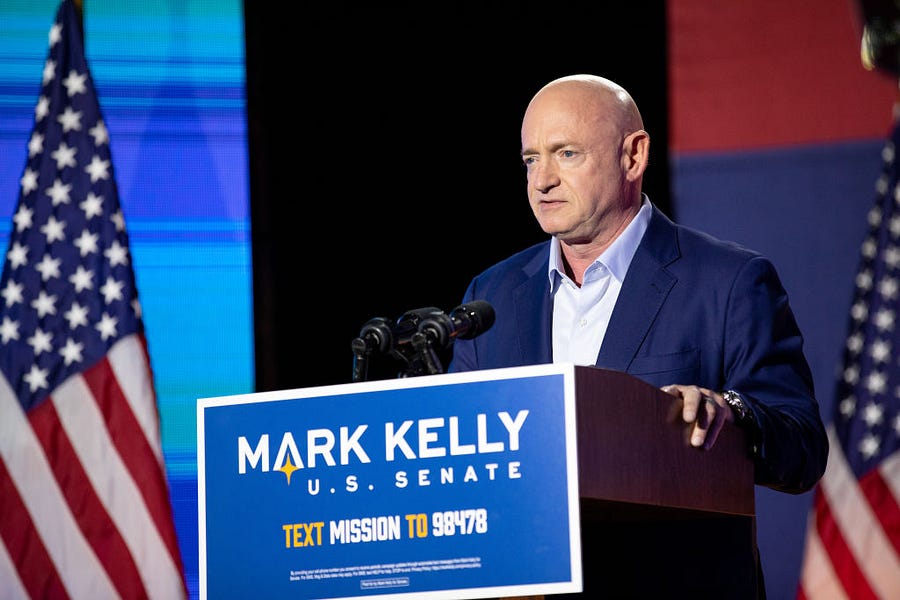Democratic nominees in nine of the 10 most competitive U.S. Senate races are leading their Republican challengers on fundraising. But if Democrats retain control of the upper chamber, money won’t be the sole reason.
Second quarter Federal Election Commission reports show that Democratic Senate nominees in Georgia, Pennsylvania, Ohio, Arizona, Nevada, North Carolina, Colorado, Washington and New Hampshire had all out-raised and outspent their GOP opponents as of June 30. Only in Wisconsin did the Republican, Sen. Ron Johnson, lead his Democratic opponent.
Candidates need serious cash to introduce themselves to voters and spread their message, but once they reach a certain baseline, even tens of millions of extra dollars don’t do much. At that point, election analysts say, fundamentals—candidate quality, the president’s approval rating, a state’s partisan lean, and kitchen-table concerns like inflation—make the difference.
Consider the last cycle. In 2020, Democratic Senate candidate Amy McGrath raised—and spent—more than $20 million more than then-Republican Majority Leader Mitch McConnell. She also lost by roughly 20 points. The trend repeated in races across the country—including South Carolina, Kansas, and Maine—demonstrating that candidates can’t simply “buy” Senate seats in hostile terrain.
That said, a fair accounting of 2020 can’t leave out the fact that Republican super PACs were able to make up for Senate GOP incumbents’ lackluster fundraising hauls.
“The Republican incumbents who withstood the green wave had more than sufficient resources to get their message out,” said Liam Donovan—a lobbyist and former Republican National Committee staffer—of the 2020 Senate cycle. “The fear for Republican challengers here is that they won’t have that money.”
Donovan added that when money gets spent matters too: Locking in television ads earlier in the race helps introduce the candidate to the electorate long before voting is underway. “If you get the hang of this fundraising thing by mid-October, voters are already voting and the airtime you want in the markets you want is not necessarily left,” he said.
Outside fundraising groups like the National Republican Senatorial Committee can make a difference in boosting a candidate’s message and name ID earlier in the race, but it hasn’t been going well for the GOP this cycle.
“By the end of July, the committee had collected a record $181.5 million — but had already spent more than 95 percent of what it had brought in,” the New York Times reported this month. “The Republican group entered August with just $23.2 million on hand, less than half of what the Senate Democratic committee had.”
Republican J.D. Vance’s struggles in Ohio are demonstrative. Vance had raised only $3.6 million and spent $3 million as of June 30, FEC reports show. By contrast, his Democratic opponent Rep. Tim Ryan had raked in $22 million and spent $18 million during the same fundraising period—ending that quarter with $3.6 million in the bank. Vance’s lackluster fundraising led the McConnell-aligned Senate Leadership Fund to pour $28 million into the race.
“Super PACs are able to come in and be the great equalizer or provide an advantage,” said GOP strategist Rob Stutzman. Had Vance performed better on the fundraising front, Stutzman argued, the SLF would’ve had more cash for candidates in bluer battlegrounds like Washington, Nevada, or Colorado.
Senate battleground fundraising dynamics could change starting Friday, when the third quarter fundraising period comes to a close and candidates begin updating their FEC filings by October 15. But as Election Day draws near, it’s worth asking how much the numbers really matter.
Boston College political science professor Dave Hopkins highlights two main reasons there’s so much written about fundraising: It’s an objective indicator, and it’s public information. But he thinks there are more useful ways to predict outcomes than studying a candidate’s coffers.
“In most competitive races these days, both sides have so much money that it doesn’t matter as much who has a little bit more than who—that’s not a real indicator of who’s likely to win,” Hopkins said. “What’s much harder to talk about, harder to quantify, harder to cover objectively, is how effective the message is that the ads are designed to spread.”
That, and candidate quality, make all the difference.







Please note that we at The Dispatch hold ourselves, our work, and our commenters to a higher standard than other places on the internet. We welcome comments that foster genuine debate or discussion—including comments critical of us or our work—but responses that include ad hominem attacks on fellow Dispatch members or are intended to stoke fear and anger may be moderated.
With your membership, you only have the ability to comment on The Morning Dispatch articles. Consider upgrading to join the conversation everywhere.